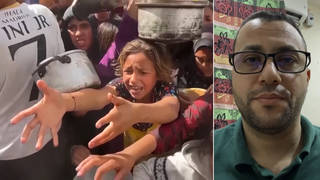
Guests
- David Colenational legal director of the American Civil Liberties Union and professor of law and public policy at Georgetown University Law Center. His most recent book is Engines of Liberty: The Power of Citizen Activists to Make Constitutional Law.
Links
President Donald Trump has fired Attorney General Jeff Sessions, replacing him with a Trump loyalist who has called special counsel Robert Mueller’s Russia investigation a “witch hunt.” Matthew Whitaker, formerly Jeff Sessions’s chief of staff, will now take charge of the Russia inquiry, prompting questions about the future of the Russia investigation and whether Trump will target Robert Mueller next. Some experts are raising questions about the legality of putting Whitaker in charge rather than Deputy Attorney General Rod Rosenstein, who had been overseeing the Russia probe. The ACLU wrote in a statement, “Jeff Sessions was the worst attorney general in modern American history. Period. But the dismissal of the nation’s top law enforcement official shouldn’t be based on political motives.” We speak with David Cole, national legal director of the American Civil Liberties Union and professor of law and public policy at Georgetown University Law Center. His most recent book is “Engines of Liberty: The Power of Citizen Activists to Make Constitutional Law.”
Transcript
NERMEEN SHAIKH: President Donald Trump has fired Attorney General Jeff Sessions, replacing him with a Trump loyalist who has called special counsel Robert Mueller’s Russia investigation a “witch hunt.” Matthew Whitaker, formerly Jeff Sessions’ chief of staff, will now take charge of the Russia inquiry. Trump announced the news on Twitter just hours after the midterm elections, prompting questions about the future of the Russia investigation and whether Trump will target Robert Mueller next.
Some experts are raising questions about the legality of putting Whitaker in charge rather than the department’s number two, Deputy Attorney General Rod Rosenstein, who had been overseeing the Russia probe. In a statement, the ACLU said, quote, “Jeff Sessions was the worst attorney general in modern American history. Period. But the dismissal of the nation’s top law enforcement official shouldn’t be based on political motives,” end-quote.
Trump has repeatedly and openly attacked Sessions for recusing himself from the Mueller investigation into alleged Russian interference in the 2016 election. This is Trump on Fox & Friends earlier this year.
PRESIDENT DONALD TRUMP: Jeff Sessions recused himself, which he shouldn’t have done—or he should have told me. Even my enemies say that “Jeff Sessions should have told you that he was going to recuse himself, and then you wouldn’t have put him in.” He took the job, and then he said, “I’m going to recuse myself.” I said, “What kind of a man is this?”
AMY GOODMAN: In 2016, Matthew Whitaker wrote an op-ed for USA Today in which he wrote he would have indicted Hillary Clinton, saying, quote, ”FBI director’s judgment was that 'no reasonable prosecutor' would bring the case. I disagree,” he wrote.
Whitaker is also a close friend and former campaign chair for Sam Clovis, when Clovis ran for public office in Iowa in 2014. Clovis, who was the 2016 Trump campaign national co-chair, revealed earlier this year that he had been interviewed by Mueller and testified for the Mueller grand jury.
In an interview with CNN last year—Whitaker was a CNN commentator—he speculated about Sessions being replaced and funding to the Mueller investigation being withdrawn. Whitaker was then the executive director of the Foundation of Accountability and Civic Trust, an organization with ties to the conservative billionaire Koch brothers.
MATTHEW WHITAKER: So I could see a scenario where Jeff Sessions is replaced with a recess appointment, and that attorney general doesn’t fire Robert Mueller, but he just reduces the budget so low that his investigation grinds to almost a halt.
AMY GOODMAN: Democrats, who won control the House in the midterms, have vowed to protect the Mueller investigation. Democratic leaders Nancy Pelosi and Chuck Schumer both called for Whitaker’s recusal from the Mueller probe.
For more on the implications of Sessions’ departure, we’re joined in New York by two guests.
David Cole is the national legal director of the American Civil Liberties Union, professor of law and public policy at Georgetown University Law Center. His most recent book, Engines of Liberty: The Power of Citizen Activists to Make Constitutional Law. His piece on Sessions, out earlier this year in The New York Review of Books, is headlined “Trump’s Inquisitor.”
Also with us, Elizabeth Holtzman, former U.S. congresswoman from New York who served on the Watergate committee—she was its youngest member—the committee that voted to impeach Richard Nixon. Her new book is out this Monday. It’s titled The Case for Impeaching Trump.
Welcome, both, to Democracy Now! David Cole, let’s begin with you. Why don’t you lay out what happened yesterday? It was about an hour after Trump held his news conference where he called the midterm elections a great success, attacked the press, attacked Republicans who hadn’t supported him fully. People asked about the Mueller probe. He sort of wove around it. And then the announcement came that Sessions, the attorney general, had been asked for his resignation, and he was out.
DAVID COLE: Right. And this is something that Trump has been threatening, repeatedly, over the course of his term, but he waited until the midterms happened, presumably concerned that if he did it beforehand, it would redound to his detriment. And then also seeing that the House is now going to be in the control of the Democrats and that he is more vulnerable with respect to investigations into his personal misconduct, he demanded Sessions’ resignation.
NERMEEN SHAIKH: Well, I mean, as you point out in The New York Review of Books piece, it’s especially surprising because, on the one hand, Sessions was one of Trump’s earliest and most loyal supporters, so it was really, in effect, the Russia probe and Sessions recusing himself that is responsible for the decision that Trump took.
DAVID COLE: Absolutely. I mean, Sessions was about as loyal to Trump as you could find anybody. He was the first senator to back Trump. He defended Trump throughout the campaign, even when the Access Hollywood tape came out. He said he didn’t think what Trump bragged he could do to women constituted sexual assault.
And then, as attorney general, he implemented every one of Trump’s conservative agendas—targeting immigrants, family separation, increasing criminal justice enforcement, increasing incarceration, reviving the war on drugs, eliminating protections for LGBTQ individuals, supporting voter suppression, ending inquiries into policing abuse in cities across the country. So he was—he is and was, I think, the most effective Cabinet member for Donald Trump.
The one thing he didn’t do for Donald Trump was to violate the rules of ethics and oversee an investigation in which he himself was implicated, because he was part of the Trump campaign.
AMY GOODMAN: And, in fact, his aide, his aide when he was a senator, Stephen Miller, who went on to become Trump’s chief—one of his chief advisers and architect of anti-immigrant policies, Miller came from—
DAVID COLE: Yeah.
AMY GOODMAN: —from Sessions. So, what was it that—what was it that he did? What was the reason he recused himself?
DAVID COLE: The reason he recused himself was because he—this is an investigation of Russia’s alleged interference in our election and the Trump campaign’s potential collusion with that investigation [sic]. Sessions was a member of that campaign. He was a leading senior member of that campaign. He also lied about his involvement with Russians in the hearings for his confirmation.
So, when this investigation launched, he went, as you are supposed to do as attorney general—he went to the ethics adviser in the Justice Department and said, “Here’s the situation. We’ve got an investigation into the Trump campaign’s possible collusion with the Russians. I was part of the Trump campaign. Can I oversee that investigation?” And, you know, the answer to that is pretty obvious: no. That’s the answer he got.
And then he followed the ethics adviser’s advice. He followed the law in that situation. The problem was, he wasn’t willing to put his personal loyalty to the president over his obligation to follow the law. And that’s essentially why he got fired.
NERMEEN SHAIKH: Well, let’s go to his replacement, Sessions’ replacement, Matthew Whitaker, and what we know about him. In an opinion piece for CNN last year, Whitaker argued that special counsel Robert Mueller was, quote, “going too far” in his investigation of Russian meddling in the 2016 presidential election.
He wrote, quote, “It does not take a lawyer or even a former federal prosecutor like myself to conclude that investigating Donald Trump’s finances or his family’s finances falls completely outside of the realm of his 2016 campaign and allegations that the campaign coordinated with the Russian government or anyone else. That goes beyond the scope of the appointment of the special counsel. … The Trump Organization’s business dealings are plainly not within the scope of the investigation, nor should they be,” Whitaker wrote.
He goes on to say that if Mueller continues along the same lines, there will be reason to conclude that his investigation was, quote, “a mere witch hunt.” And during a 2017 radio interview, Whitaker dismissed the possibility of the president being charged with obstruction of justice out of the Mueller investigation.
MATTHEW WHITAKER: There is no criminal obstruction of justice charge to be had here. There’s just—the evidence is weak. No reasonable prosecutor would bring a case on what we know right now, and—you know, because it all boils down to what was the president’s intent, and we really don’t have any evidence of what the president’s intent was. The investigation continues on. He still hasn’t—he didn’t stop it.
NERMEEN SHAIKH: So, that’s Matthew Whitaker in 2017, who has been—now is temporarily taking charge of Attorney General Jeff Sessions’—former Attorney General Jeff Sessions’ position. So, could you talk about—I mean, he will now be overseeing the Russia probe. So, can you talk about—I mean, this is a guy who’s come out explicitly to say that the Russia probe goes too far and that there is not likely to be any evidence of collusion or, you know, Trump being implicated. So, talk about some of the concerns about that.
DAVID COLE: So, you know, the whole purpose of having a special counsel is to ensure that there’s some independence in an investigation of high-level executive branch officials—here, the highest level, the president of the United States. And now Trump has fired the person who followed the rules of ethics and stepped aside to ensure that independence, and has put in place a man who got his job by being loyal to the president. And that raises really serious concerns.
Now, the law provides that the attorney general cannot fire the special counsel, except for dereliction of duty, misconduct, good cause and the like. So, you can’t fire him just because you disagree with what he’s doing. But there’s no appeal. There’s no opportunity to take that to a court. There’s a bipartisan bill in Congress that would put that protection in place, but, you know, unlikely that that’s going to go anywhere.
So, number one, he could fire him. Number two, even without firing him, he can put constraints on the special counsel’s investigation by funding limits, by—the special counsel is supposed to consult with and inform the attorney general of any significant developments.
AMY GOODMAN: In fact, he already said on CNN—the question of just reduce the funding, and you’ll effectively stop the investigation.
DAVID COLE: Right. He said that before he was in office. So, you know, the question is: Now that he’s in office, has taken the oath, will he in fact undermine his oath to undermine this investigation? And I think—you know, I think we all have to pay incredibly close attention to every step that he takes. And it’s incumbent on the people, it’s incumbent upon Congress, it’s incumbent on the House, in particular, to hold this president accountable and make sure we get an accurate response—
AMY GOODMAN: So, the Democratic leaders—
DAVID COLE: —to the question: Was there collusion?
AMY GOODMAN: The Democratic leaders Schumer and Pelosi have already sent letters demanding that no evidence be tampered with, no emails, no WhatsApp, no anything, tweets, texts, around the whole issue of the choice of Whitaker. And then you have the side-stepping around Rod Rosenstein, right? He was the number two man.
DAVID COLE: Yeah.
AMY GOODMAN: You had Whitaker, who was the chief of staff, who, reportedly—Clovis, who was Trump’s campaign manager, right? Clovis in Iowa—Clovis told his pal Whitaker, “Get on TV. Get Trump’s attention.” And so he started saying these things on CNN about ending the Mueller probe. So now he moves into the Justice Department. He is chosen as the attorney general by Trump as he fires Sessions. Rod Rosenstein was the one who was in charge of this investigation. Even if Whitaker was made attorney general, he could have kept Rosenstein in charge, but he’s not. So, talk about the significance of that and even the legality of this.
DAVID COLE: So, I think it’s formally legal, in the sense that the president has the power to dismiss Sessions, has the power to appoint a chief of staff as the acting attorney general. And once you have an acting attorney general who is not recused, it’s legal for that acting attorney general to be involved in overseeing the investigation. But it’s, I think, an abuse of that power, if—what certainly appears to be—it is designed to obstruct justice. That’s the thing. There are lots of things one can do legally, but if you do them for the purpose of obstructing justice, it’s a crime. So, firing Comey, it’s legal to fire the head of the FBI, but if he fired Comey in order to obstruct the investigation, that’s a crime. And here, if he fired Sessions and put this loyalist in place to obstruct the investigation, that’s a crime.
AMY GOODMAN: So, we’re going to break and then come back, and we’ll be joined by Liz Holtzman, as well, the youngest member of the Watergate committee. She was a U.S. congressmember from New York. The obvious question: Does this echo back to the Watergate times, to Richard Nixon? We’re talking what? Some 45 years ago, Saturday Night Massacre, and what that exactly was. We’re here on Democracy Now! talking about the Trump administration, President Trump firing his attorney general, Jeff Sessions. Stay with us.












Media Options